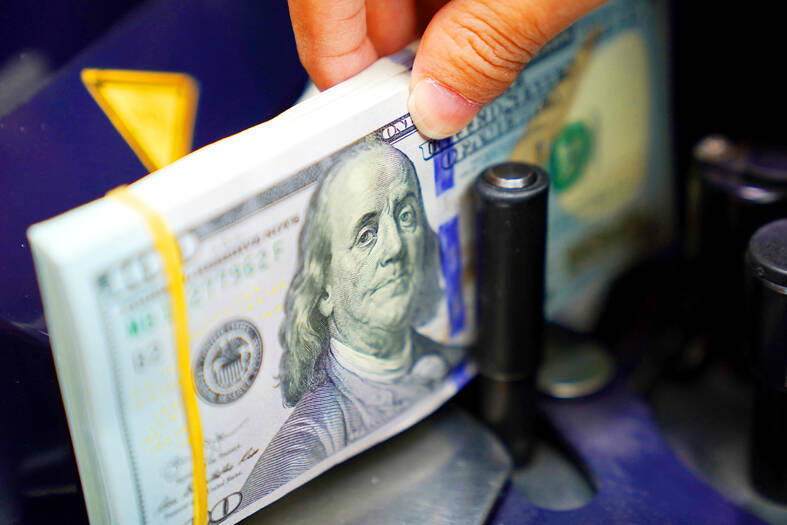The US dollar on Friday dipped as a US Federal Reserve official said rate hikes are likely to slow and investors took profits from earlier gains after last month’s US jobs data and wage inflation were surprisingly robust, obscuring the outlook for how hawkish the US central bank would be.
The greenback initially jumped after data showed that employers added 263,000 jobs last month, well above estimates of 200,000.
“Stronger-than-expected hiring can buy the Fed more time to stay aggressive,” said Joe Manimbo, senior market analyst at Convera in Washington.

Photo: Bloomberg
Investors zeroed in on an increase in average hourly earnings by 0.6 percent in the month, above expectations of a 0.3 percent gain, and the participation rate, which declined to 62.1 percent, said Marc Chandler, chief market strategist at Bannockburn Global Forex in New York.
“Both of those measures reflect more than the nonfarm payroll growth number the tightness of the labor market,” he said.
However, the US dollar gave back gains as investors took profits before the weekend and as Fed officials spoke on the outlook.
Chicago Fed President Charles Evans said that the pace of increases is likely to slow, but the US central bank would likely need to raise borrowing costs to a “slightly higher” peak than envisioned in forecasts from September.
Richmond Fed President Thomas Barkin said the US is likely in a sustained period in which there would continue to be a shortage of workers, complicating the Fed’s aim of getting labor demand back into balance.
The US dollar index on Friday closed down 0.21 percent against a basket of currencies at 104.51, declining 1.37 percent weekly.
The New Taiwan dollar rose against the US dollar on Friday, gaining NT$0.028 to close at NT$30.605, up 0.97 percent from NT$30.905 a week earlier.
The greenback slipped 0.76 percent against the Japanese yen to ¥134.31, while the euro gained 0.15 percent to US$1.0543.
Additional reporting by CNA, with staff writer

Zhang Yazhou was sitting in the passenger seat of her Tesla Model 3 when she said she heard her father’s panicked voice: The brakes do not work. Approaching a red light, her father swerved around two cars before plowing into a sport utility vehicle and a sedan, and crashing into a large concrete barrier. Stunned, Zhang gazed at the deflating airbag in front of her. She could never have imagined what was to come: Tesla Inc sued her for defamation for complaining publicly about the vehicles brakes — and won. A Chinese court ordered Zhang to pay more than US$23,000 in

Taiwan Semiconductor Manufacturing Co (TSMC, 台積電) yesterday said that its investment plan in Arizona is going according to schedule, following a local media report claiming that the company is planning to break ground on its third wafer fab in the US in June. In a statement, TSMC said it does not comment on market speculation, but that its investments in Arizona are proceeding well. TSMC is investing more than US$65 billion in Arizona to build three advanced wafer fabs. The first one has started production using the 4-nanometer (nm) process, while the second one would start mass production using the

US President Donald Trump has threatened to impose up to 100 percent tariffs on Taiwan’s semiconductor exports to the US to encourage chip manufacturers to move their production facilities to the US, but experts are questioning his strategy, warning it could harm industries on both sides. “I’m very confused and surprised that the Trump administration would try and do this,” Bob O’Donnell, chief analyst and founder of TECHnalysis Research in California, said in an interview with the Central News Agency on Wednesday. “It seems to reflect the fact that they don’t understand how the semiconductor industry really works,” O’Donnell said. Economic sanctions would

‘NO DISRUPTION’: A US trade association said that it was ready to work with the US administration to streamline the program’s requirements and achieve shared goals The White House is seeking to renegotiate US CHIPS and Science Act awards and has signaled delays to some upcoming semiconductor disbursements, two sources familiar with the matter told reporters. The people, along with a third source, said that the new US administration is reviewing the projects awarded under the 2022 law, meant to boost US domestic semiconductor output with US$39 billion in subsidies. Washington plans to renegotiate some of the deals after assessing and changing current requirements, the sources said. The extent of the possible changes and how they would affect agreements already finalized was not immediately clear. It was not known